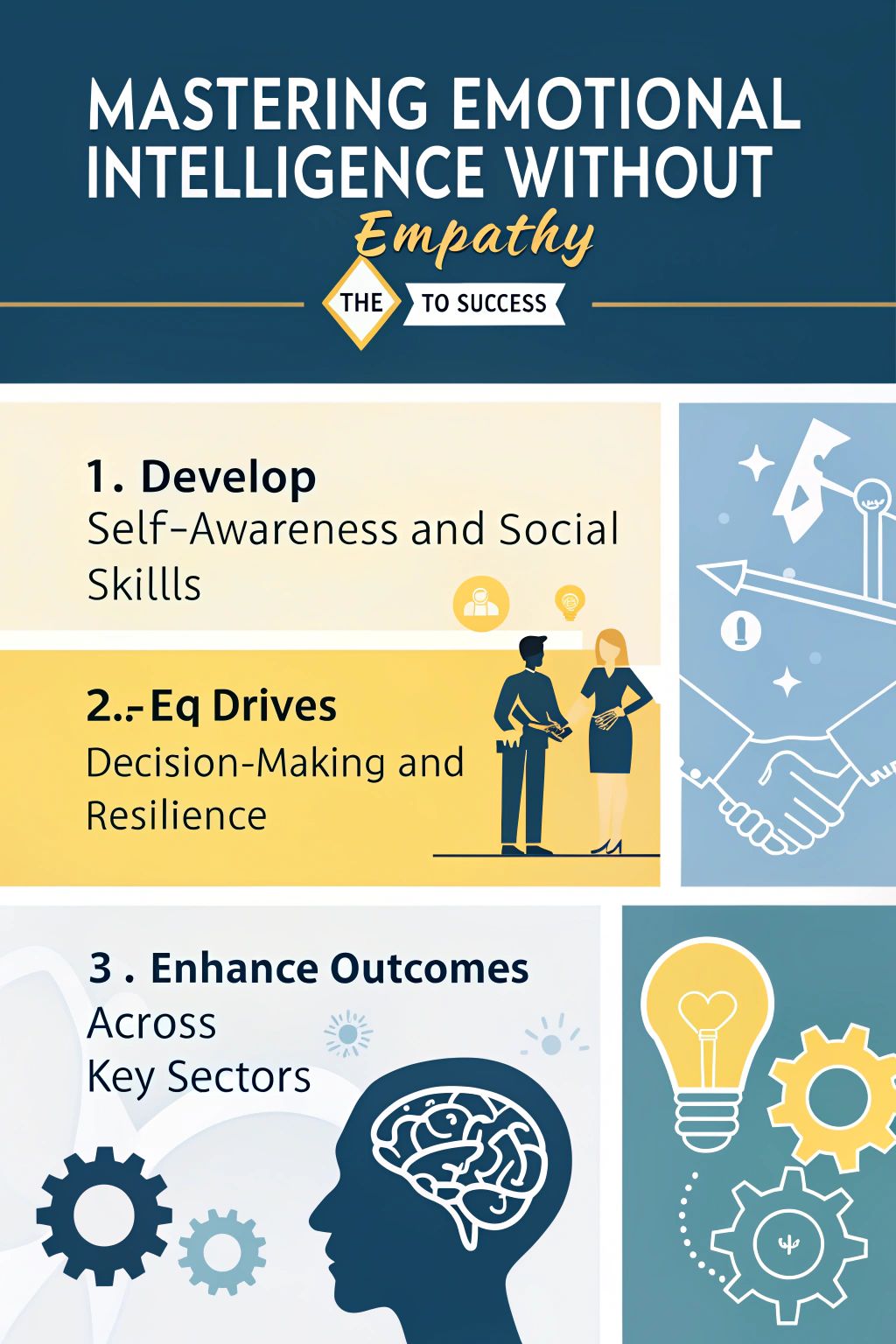Many people are of the opinion that understanding and sharing the feelings of others is a necessity for success in life. However, what if there was an alternate approach, achieving success without constant reliance on empathy? This concept is known as “emotional intelligence without empathy“.
Possessing emotional intelligence is essential to successfully managing personal and professional relationships. Still, it is not always easy for everyone to strike a balance with empathy.
One detail emerges prominently: emotional intelligence often takes precedence over intellectual ability (IQ) when it comes to realising success. Our article will explain how concentrating on emotional intelligence, even without extensive empathy, can result in improved decision-making and enhanced leadership abilities.
Continue reading to learn how you can cultivate this skill.

Defining Emotional Intelligence and Empathy

Emotional intelligence refers to the capacity to comprehend and regulate our own emotions, as well as recognising and empathising with the feelings of others. It centres on self-awareness and the ability to manage emotions effectively.
Understanding Emotional Intelligence
Emotional intelligence (EQ) is the artistry of distinguishing, comprehending, and regulating one’s sentiments. It extends to the competence to manage the emotional responses of others.
This capability is highly influential in our everyday exchanges and judgement processes. Daniel Goleman, a respected figure in this domain, underlines that EQ comprises self-consciousness, self-supervision, determination, societal discernment, and interpersonal expertise.
Investigations reveal that a high emotional intelligence quotient can yield superior outcomes in educational and occupational settings.
Individuals possessing a solid EQ excel in administering their thoughts and actions. They maintain their drive and demonstrate resilience to stress. They comprehend the sentiments of others with ease, making them highly effective in collaborative environments.
Deciphering facial expressions or shifts in body language enables them to react suitably in a spectrum of situations. Such proficiencies promote the formation of secure associations, both in a professional and personal capacity.
Exploring the Role of Empathy in Emotional Intelligence
Empathy allows us to comprehend and reciprocate the sentiments of others. It is a fundamental component in shaping our emotional intelligence. This trait encourages robust bonds by facilitating transparent dialogue, cultivating trust, and promoting comprehension in diverse relationships.
When we comprehend the feelings of others, our response tends to be more compassionate and efficient.
Leaders who incorporate empathy into their emotional intelligence abilities often excel. They handle teams more efficiently and resolve disputes with ease. Empathy also enhances the quality of patient care as doctors can profoundly relate to their patients’ experiences.
These relationships result in improved satisfaction and adherence among those they assist.
Emotional Intelligence Without Empathy
Emotional intelligence without empathy is an achievable concept that offers significant benefits in various settings. Leaders and professionals can enhance their decision-making, conflict resolution, and personal resilience by prioritising emotional intelligence over empathy.
This approach allows individuals to better regulate their emotions and understand others, resulting in improved communication skills and stronger interpersonal relationships.
The Concept and Its Feasibility
Many individuals believe that emotional intelligence and empathy are inherently linked. However, the notion that one can have a high degree of emotional intelligence without being highly empathic is certainly viable.
Abilities such as self-control, consciousness, and social aptitude fall into this category. These don’t always necessitate a deep understanding of another person’s sentiments. For example, an individual with alexithymia may have difficulties identifying or expressing emotions but may still effectively learn and utilise emotional skills.
Executives and business professionals have demonstrated that leading without a heavy reliance on empathy is achievable. They hone in on comprehending other people’s needs through thought processes, rather than emotional ones.
This method facilitates clear thinking, decision-making, and efficient problem resolution in a variety of environments. The secret is in developing specific skills such as self-motivation and the ability to read social signals, which are components of emotional aptitude despite a minimal capacity for empathic feelings.
Examples from Business and Leadership
In the business world, leaders with high emotional intelligence (EI) often outperform those who rely solely on empathy. For instance, consider a CEO who uses EI to navigate through tough decisions that affect both employees and business outcomes.
This leader balances understanding employees’ emotions with the need to achieve company goals. They employ strategies such as open communication and feedback systems, which are parts of social skills and mental well-being practices.
These actions show a grasp of cognitive empathy – recognising what others feel without necessarily sharing those feelings.
Successful entrepreneurs also demonstrate how EI without strong empathy can lead to innovation and resilience. They spot trends, adapt to market changes, and understand their team’s dynamics without becoming overly involved in personal emotions.
This approach allows them to guide their companies through ups and downs effectively while maintaining healthy relationships with colleagues and partners. It involves self-regulation techniques where they manage their own emotions to motivate teams towards achieving set objectives, illustrating how managing one’s own behaviour impacts overall success in leadership roles.
Benefits of Emphasising Emotional Intelligence Over Empathy
Emphasising emotional intelligence over empathy offers several advantages. It leads to improved decision-making, enhanced conflict resolution, and greater personal resilience. This approach also allows for a deeper understanding of others and adherence to social norms in various settings.
Improved Decision-Making
Emphasising emotional intelligence boosts decision-making skills. People with high emotional intelligence understand their feelings and others’ emotions. This understanding helps them make better choices in tough situations.
Studies show that those strong in this area tend to decide that lead to success.
This ability plays a big part in solving problems at work and in personal life. Leaders who focus on improving their emotional self-regulation can assess situations more clearly. They avoid letting personal feelings cloud their judgement.
Making decisions based on a clear understanding of everyone involved leads to positive outcomes more often than not.
Enhanced Conflict Resolution
Focusing on emotional intelligence improves how we solve conflicts. It lets us understand others’ needs without getting too caught up in their feelings. This balance helps leaders and teams work through disagreements more effectively.
With better emotional intelligence, people don’t just see their own side. They also consider others’ views, making it easier to find solutions that everyone agrees on.
This approach reduces the time and energy wasted on workplace disputes. Employees feel heard and respected, which boosts morale and productivity. Businesses thrive when team members know how to manage emotions during disagreements.
They move past conflicts faster, keeping focus on common goals rather than personal differences.
Greater Personal Resilience
High EI helps people manage tough emotions. This skill leads to better ways of coping. People with high emotional intelligence don’t let stress knock them down. Instead, they find ways to move forward and adapt.
They use their understanding of emotions to stay strong in hard times.
Having high EI means you bounce back faster after problems. It’s like having a mental toolkit for life’s ups and downs. You know how to calm yourself down and think clearly under pressure.
This makes you more resilient, ready to take on whatever comes your way without falling apart.
Strategies for Applying Emotional Intelligence in Leadership
Leaders can apply emotional intelligence in leadership through several strategies. Firstly, nurturing self-awareness is crucial. By recognising their own emotions and understanding how these impact their decisions and interactions, leaders can effectively manage themselves and inspire trust within their teams.
As well as this, developing social skills is vital for effective leadership. Building strong relationships with team members through active listening and empathy enhances collaboration and communication.
Leaders should also strive to cultivate a positive work environment that nurtures emotional intelligence among team members. Encouraging open communication, providing constructive feedback, and promoting a culture of respect contribute to a more emotionally intelligent workforce.
Moreover, practising empathy helps leaders understand the perspectives of others, leading to improved conflict resolution and greater rapport within the team.
Moreover, incorporating emotional intelligence assessments into hiring processes enables leaders to build teams with diverse yet complimentary emotional skill sets. This allows for better problem-solving by leveraging different strengths in emotional understanding among employees.
Challenges and Criticisms
Mastering emotional intelligence without empathy may pose challenges in interpersonal relationships and team dynamics. Grasping these subtleties is pivotal for successful implementation. Keep reading to delve into the potential impact and considerate solutions.
Potential for Misunderstanding and Alienation
Limited emotional intelligence can lead to a lack of understanding and connection with others, potentially resulting in misinterpretation and isolation. Individuals with restricted EI may find it challenging to grasp the emotions expressed by those around them, which can lead to conflicts and strained relationships.
Additionally, their inability to comprehend and respond appropriately to others’ feelings might leave them feeling disconnected from social interactions, impacting their overall well-being.
In various settings such as the workplace or personal relationships, a lack of emotional intelligence could hinder effective communication and mutual understanding. This insufficiency of empathy may cause individuals with low EI to inadvertently alienate themselves from their peers due to their inability to empathise or connect on a deeper level emotionally.
Such misunderstandings stemming from low emotional intelligence undermine one’s ability to build stronger connections and foster meaningful relationships.
Ethical Considerations
Ethical considerations in mastering emotional intelligence without empathy are of paramount importance. With the decline of empathy being linked to career progression but also serving as a protective factor against burnout, it becomes crucial to assess the impact of prioritising emotional intelligence over empathy in both personal and professional settings.
The interconnected nature of emotional intelligence and empathy underlines the need for ethical awareness in how individuals navigate their interactions and relationships.
Emphasising emotional intelligence without empathy could raise concerns regarding interpersonal skills, potential manipulation, and impairment within societal dynamics. It is vital to closely examine the ethical implications surrounding this approach, particularly concerning its application within leadership roles and business environments.
Furthermore, understanding how this strategy may influence decision-making processes and affect relationships would be crucial when considering its implementation within various contexts.
Developing Emotional Intelligence Independently of Empathy
Enhancing self-regulation and awareness, as well as applying emotional intelligence in various settings, involves developing emotional intelligence independently of empathy. To explore this further, delve into the blog to gain valuable insights on effectively navigating the emotions realm.
Techniques for Enhancing Self-Regulation and Awareness
Enhancing self-regulation and awareness involves various techniques that can be beneficial for personal development. These include mindfulness practices, such as meditation and deep breathing exercises, which have been shown to reduce stress levels and improve emotional regulation.
In addition, maintaining a journal or diary can aid in self-reflection and understanding of one’s emotions, contributing to heightened awareness of personal triggers and patterns of reaction.
Another effective technique is seeking feedback from peers or mentors within professional settings. This allows individuals to gain external perspectives on their behaviors and emotional responses, fostering greater self-awareness.
Moreover, incorporating regular physical exercise into one’s routine has been linked to improved mood regulation and overall well-being. By implementing these strategies consistently, individuals can ultimately enhance their capacity for self-regulation and heighten their emotional intelligence without relying solely on empathy.
Strategies for Applying Emotional Intelligence in Various Settings
Applying emotional intelligence in various settings involves self-awareness, empathy and understanding others. In leadership roles, it’s vital to demonstrate empathy while making decisions and resolving conflicts.
Identifying and managing our emotions enhances personal resilience. Strategies for this include practicing active listening, seeking diverse perspectives, and fostering an inclusive environment that values emotional expression.
In healthcare, emotional intelligence is vital for building therapeutic relationships and providing patient-centred care. Implementing these strategies can lead to improved interactions with patients and more effective teamwork among healthcare professionals.
In educational settings, promoting emotional intelligence contributes to a positive learning environment by encouraging students’ social-emotional development. Teachers can implement strategies such as teaching conflict resolution skills and modelling empathetic behaviour.
Moreover, in business environments, integrating emotional intelligence into management practices leads to more efficient teamwork and better employee well-being – ultimately impacting company performance positively.
These strategies involve creating spaces for open communication about emotions and providing opportunities for skill-building in areas such as self-regulation and empathy.
Conclusion
Mastering emotional intelligence sans empathy is an essential skill for navigating the intricate landscape of personal and professional relationships. Understanding emotions and managing them effectively can lead to improved decision-making, conflict resolution, and personal resilience.
By developing strategies to enhance self-regulation and awareness, individuals can cultivate strong emotional intelligence independent of empathy. This approach not only allows for better connection with others but also promotes success in various settings, positioning individuals as adept leaders in today’s competitive digital world.
MindOwl Founder – My own struggles in life have led me to this path of understanding the human condition. I graduated with a bachelor’s degree in philosophy before completing a master’s degree in psychology at Regent’s University London. I then completed a postgraduate diploma in philosophical counselling before being trained in ACT (Acceptance and commitment therapy).
I’ve spent the last eight years studying the encounter of meditative practices with modern psychology.

